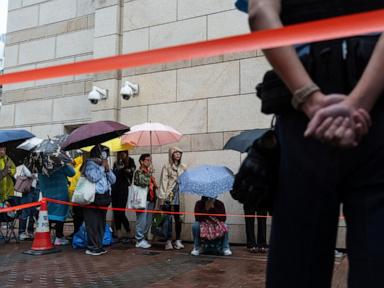Biden’s easy case for clemency: prisoners in home confinement

President Biden made many bold promises to reform the criminal justice system during his 2020 presidential campaign. Today, many of those promises remain unfulfilled. However, he still has time to make a meaningful impact.
No doubt Biden is considering the use of a special power granted to the president in the Constitution — the power to grant clemency. Only the president can pardon someone convicted of a federal crime or commute their sentence.
To date, President Biden has made very little use of this authority. Since taking office he has pardoned 25 people and commuted the sentences of 131 people. Several notable professors have recently made the case for Biden to consider his legacy and grant pardons to several deserving categories of people. They are spot on in their assessments.
But there is one group they mentioned that seems like an easy decision for the president, and the first group President Biden pardons.
During the Pandemic, the Bureau of Prisons moved over 36,000 people to home confinement under the CARES Act. The CARES Act expanded the amount of time individuals could be placed in home confinement during the pandemic.
Under the criteria established by the Trump Administration’s Department of Justice, these people were carefully selected as low or minimum security risk, non-violent offenders. They have completed more than half their sentences, with high risk for complications of COVID. Most were older (over age 50) or had underlying health conditions. All had clean conduct while in prison and were deemed to not be of risk to the community.
I was assistant director at the Bureau of Prisons at the time, and I co-chaired a committee where we carefully assessed every eligible person to ensure that not only did they meet the criteria, but that there was a low likelihood that they would commit more crimes if placed on home confinement.
This program was universally deemed a success. Very few of the people in home confinement were rearrested for new crimes. In fact, a Bureau Of Prison study concluded that those in home confinement under the CARES Act had a lower recidivism rate than those not under the CARES Act, and may actually have contributed to a decrease in violent offenses.
Clearly the placement of this group of people in home confinement was not hurtful to society and it assisted the bureau in reducing their prison population. Most people in CARES Act home confinement have been released from custody. According to the Bureau of Prisons’ Office of Public Affairs, there are just over 1,500 people remaining on home confinement under the CARES Act.
Late in the Trump administration, the Justice Department’s Office of Legal Counsel issued an opinion stating that when the pandemic was declared over, the bureau would be required to recall all the inmates placed in home confinement under the CARES Act.
This caused considerable stress and concern, as it meant people who had been out of prison serving on home confinement would have to return to prison. Many had jobs, were caring for other family members (parents or children), and were productive members of society despite being confined to their homes.
Early in the Biden administration, the office issued a revised opinion, reversing the prior opinion, and stating that the bureau retained the discretion to leave on home confinement those placed there under the CARES Act. This opinion was memorialized in a Final Rule. Of course, this was a great relief to the many who had been living at home for several years.
Now that President-elect Donald Trump is returning to the White House, those remaining in home confinement are again concerned that his administration will reverse course and send them back to prison. Only this time they have been quietly living at home and working in our communities for almost five years. This uncertainty is creating a lot of anxiety among these people and their families.
We do not know what a new Trump administration will do, but there is no reason for us to wait and see. Until Jan. 20, Biden has the unique power to grant clemency. This group of people has proven to be trustworthy and safe in our society. If ever there was a case for clemency, this is it.
Hugh Hurwitz held multiple positions with the Federal Bureau of Prisons, including Acting Director, Assistant Director for Administration, and Assistant Director for Reentry Services. Currently, he provides consulting services in prison management, reentry and reform, organizational change, and other areas. He is a member of the Council on Criminal Justice.
-

Biden urged to use clemency powers to tackle ‘crisis’ of US mass incarceration
World - The Guardian - 6 days ago -

FTX’s engineering chief Nishad Singh spared prison time in fraud case
Business - Financial Times - October 30 -

US woman in 1990 'killer clown' case released from prison
Top stories - BBC News - November 3 -

Woman convicted in Florida killer-clown cold case released from prison
Top stories - NBC News - November 3 -

Pakistan's Imran Khan gets bail in a graft case but with more cases pending, he is staying in prison
World - ABC News - 6 days ago -
A Singapore oil magnate faces prison in a major fraud case over financing trade
World - ABC News - November 18 -

45 pro-democracy activists get 4 to 10 years in prison in Hong Kong
World - ABC News - November 19 -

FTX co-founder Wang avoids prison after assisting in Bankman-Fried case
Business - Financial Times - 6 days ago
More from The Hill
-

John Phelan nominated to lead Navy under Trump
Politics - The Hill - 5 hours ago -

Jamieson Greer selected as Trump's United States Trade Representative
Politics - The Hill - 6 hours ago -

Jim O’Neill selected to lead HHS alongside RFK Jr. as deputy
Politics - The Hill - 6 hours ago -

Trump completes health team with Jay Bhattacharya as NIH pick
Politics - The Hill - 6 hours ago -

Trump taps Kevin Hassett as National Economic Council head
Politics - The Hill - 7 hours ago